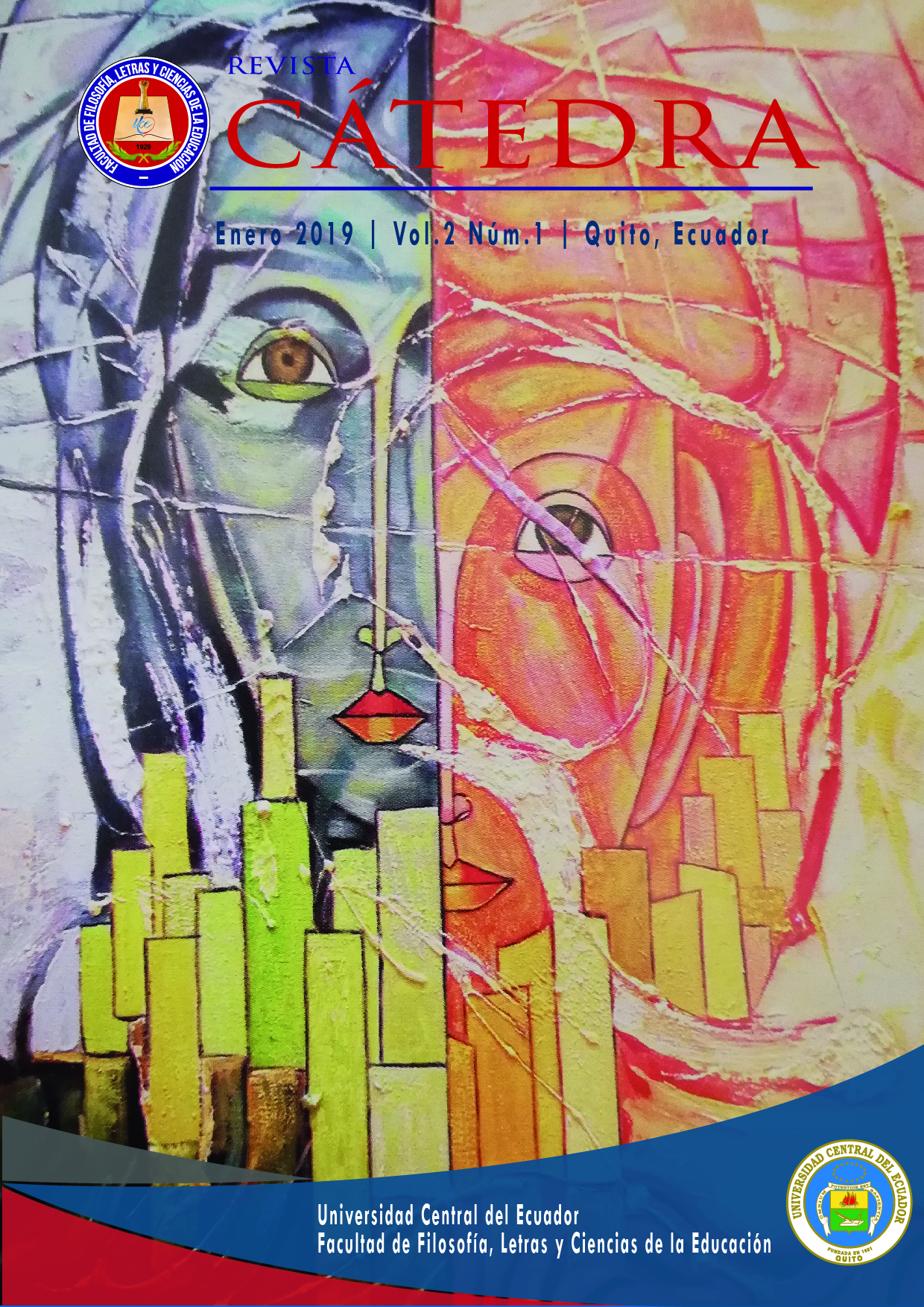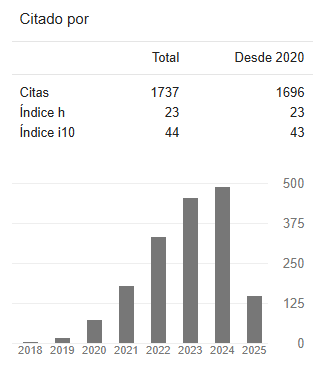The managerial and educational performance as an opportunity to improve the educational quality
DOI:
https://doi.org/10.29166/catedra.v2i1.1436Keywords:
Pedagogical accompaniment, quality of teaching, teaching performance, learning strategies, pedagogical leadership.Abstract
The research investigates the perceptions of managers and teachers about educational quality and the main difficulties facing education today. It also evaluates the teacher's performance in the classroom, by observing the class and the permanent pedagogical reflection of the teaching processes. The latter being a priority task of the control organisms. In the research it was necessary to review the conceptual bases inherent to the teaching performance, pedagogical accompaniment, leadership, learning strategies and the quality of teaching. The study methodology was based on the qualitative approach, supported by two techniques. The observation of the class with the technical instrument called the observation tab, which allowed visualizing how the teaching and learning processes are carried out. And the semi-structured interview applied to a sample of 43 investigated among teachers and managers of Zone 9, Province of Pichincha. The results obtained from these instruments allowed to know the real strengths and weaknesses existing in teaching.
Finally, it was determined that the activities proposed to develop the class have little relation to each other, do not attend to a pedagogical approach, nor to a method, technique, strategy or teaching process. In addition, the teaching focuses on the teacher, who exposes their knowledge, while the student's participation is minimal. These and other findings allowed us to conclude that managerial and teaching performance influence learning and maintaining traditional pedagogical practices will not contribute to the improvement of the quality of teaching.
Downloads
References
Barber, M., & Mourshed, M. (2008). Cómo hicieron los sistemas educativos con mejor desempeño del mundo para alcanzar sus objetivos. Chile: San Marino. Recuperado el 11 de 2018
Bernal, C. A. (2010). Metodología de la investigación. Bogotá: Delfín Ltda. Recuperado el 7 de 12 de 2018
Braslavsky, C. (2006). Diez factores para una educación de calidad para todos en el siglo XXI. REICE.-Revista Electrónica Iberoamericana sobre Calidad, Eficacia y Cambio en Educación 2006, , 4, N° 2e, 84-101. Recuperado el 1 de 12 de 2018, de http://www.redalyc.org/articulo.oa?id=55140206
Educación-Internacional. (4 de 4 de 2017). https://www.ei-ie.org/. Recuperado el 28 de 11 de 2018, de Enseñanza de calidad: https://www.ei-ie.org/spa/detail_page/4657/ense%C3%B1anza-de-calidad
Estrada G., A. (2016). Instrumento para detectar las necesidades de formación docente. Revista Iberoamericana de Producción Académica y Gestión Educativa. Recuperado el 1 de 12 de 2018, de https://www.pag.org.mx/index.php/PAG/article/download/618/709
FONDEP. (07 de 2008). https://studylib.es. Recuperado el 01 de 05 de 2018, de Guía para el acompañamiento pedagógico de proyectos de innovación en las regiones: https://studylib.es/doc/5111210/gu%C3%ADa-para-el-acompa%C3%B1amiento-pedag%C3%B3gico.
Hernández, R., Fernández, C., & Baptista, M. (2014). Metodología de la investigación. México: McGraw-HILL/INTERAMERICANA EDITORES, S.A. DE C.V. Recuperado el 7 de 12 de 2018
Herrera C., Á. (16 de 03 de 2009). http://prepajocotepec.sems.udg.mx/. Recuperado el 20 de 11 de 2018, de LAS ESTRATEGIAS DE APRENDIZAJE: http://prepajocotepec.sems.udg.mx/sites/default/files/estrategias_herrera_capita_0.pdf
INSTITUTO NACIONAL DE EVALUACIÓN EDUCATIVA. (11 de 2018). http://www.evaluacion.gob.ec/. Recuperado el 25 de 11 de 2018, de http://www.evaluacion.gob.ec/dagireportes/nacional/2017-2018f.pdf
Leithwood, K., Day, C., Sammons, P., Harris, A., & Hopkins, D. (2006). Successful School Leadership. What it is and how it influences pupil learning. UK: National College for School Leadership. Recuperado el 1 de 12 de 2018
Martínez R., S., & Lavín G., J. (2017). APROXIMACIÓN AL CONCEPTO DE DESEMPEÑO DOCENTE, UNA REVISIÓN CONCEPTUAL SOBRE SU DELIMITACIÓN. POLÍTICA Y GESTIÓN DE LA EDUCACIÓN Y SU EVALUACIÓN, LA CIENCIA Y LA TECNOLOGÍA., (pág. 11). San Luis Potosí. Recuperado el 2 de 12 de 2018, de http://www.comie.org.mx/congreso/memoriaelectronica/v14/doc/2657.pdf
MINEDUC. (2010). https://educacion.gob.ec/. Recuperado el 25 de 11 de 2018, de Desempeño del Docente: https://educacion.gob.ec/desempeno-del-docente-sne/
MINEDUC. (2017). MANUAL PARA LA IMPLEMENTACIÓN Y EVALUACIÓN DE LOS ESTÁNDARES DE CALIDAD EDUCATIVA. Quito, Ecuador: Ministerio de Educación del Ecuador (MinEduc), 2017. Recuperado el 9 de 12 de 2018
Ramírez N., M. (05 de 2011). http://www.eumed.net/. Recuperado el 2 de 12 de 2018, de Evaluación y auto evaluación docente: http://www.eumed.net/libros-gratis/2011d/1021/evaluacion_docente.html
Robalino C., M. (07 de 2005). http://unesdoc.unesco.org/. Recuperado el 2 de 12 de 2018, de ¿ACTOR O PROTAGONISTA? DILEMAS Y RESPONSABILIDADES SOCIALES DE LA PROFESIÓN DEL DOCENTE: http://unesdoc.unesco.org/images/0014/001446/144666s.pdf
UNESCO. (2014). http://unesdoc.unesco.org/. Recuperado el 2 de 12 de 2018, de ENSEÑANZA Y APRENDIZAJE: Lograr la calidad para todos: http://unesdoc.unesco.org/images/0022/002261/226159s.pdf
UNESCO. (09 de ABRIL de 2018). https://es.unesco.org. Recuperado el 2 de 12 de 2018, de ¿Qué determina el buen desempeño de un docente?: https://es.unesco.org/news/que-determina-buen-desempeno-docente
Downloads
Published
Versions
- 2020-09-03 (2)
- 2019-01-30 (1)









